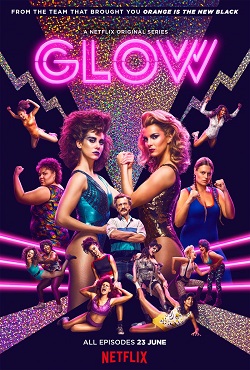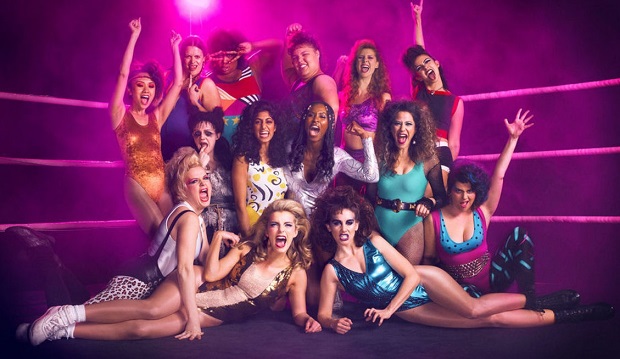There’s a scene in episode 5 of GLOW in which the director Sam Sylvia pitches the show to a network exec, explaining that it will be “deeper” than your average junk food TV, showcasing women “wrestling with their own female stereotypes, metaphorically,” arguing this will “really resonate with the female audiences.” And of the male audience, he remarks, “let’s be honest, they’re going to watch because girls wrestling is fucking hot.” It’s hard to imagine either incarnation of GLOW – the original Gorgeous Ladies Of Wrestling TV series, or this new dramatisation – being pitched any other way. And in each instance, it’s hard to imagine it was difficult to sell. It’s a real have-your-cake-and-eat-it concept, allowing for a wide berth of nuanced female characters – something there has, not unreasonably, been increasing demand for in recent years – whilst also presenting an unabashedly low-brow, sexualised spectacle. Plus it’s set in the 1980s, and for some reason we can’t get enough of that recently; so really, there was no way GLOW could fail. And it hasn’t. These first ten episodes – and I strongly doubt they’ll be the last, even though Netflix has been a bit swift with the axe lately (Sense8, The Get-Down, Girlboss) – are addictive stuff, perfect for the now-obligatory binge viewing, and bound to leave you clamouring for season 2 ASAP.
Having never been an aficionado of wrestling, I hadn’t heard of the Gorgeous Ladies Of Wrestling until earlier this year, when word broke of the new Netflix series. For the benefit of the uninitiated, yes, GLOW was indeed a real thing (well, y’know, ‘real’ in a pro-wrestling sense), which ran on TV from 1986 to 1990, with exploitation director Matt Cimber at the helm. Netflix also hosts a 2011 documentary on the subject – GLOW: The Story of the Gorgeous Ladies of Wrestling – which is well worth a look, not least to underline where fiction diverges from fact. Certain characters in the 2017 drama are clearly modelled on real GLOW figures – Marc Maron’s sleazy Sam is an exaggeration of Cimber, Britney Young’s Carmen/Machu Picchu draws on real GLOW wrestler Mount Fiji, and GLOW also had a central face named Liberty – but otherwise this is a heavily fictionalised take on the material, adding reams of behind-the-scenes drama that, so as I’m aware, did not occur in reality. Not that any of this should in any way be considered a problem; just be aware going in that the show does not tell the true life story.
 GLOW has been promoted heavily on the fact that it’s from the same core team as arguably Netflix’s most enduring hit show, Orange is the New Black. It’s perhaps unsurprising, then, that just as in OITNB, the show primarily centres on one somewhat square, middle class character who unwittingly stumbles into this bizarre new walk of life and provides the audience with their primary point of identification. Here, that character is Alison Brie’s Ruth Wilder, a hugely ambitious and serious actress (read: overbearing theatre nerd) who is growing exhausted with her inability to find fulfilling work, or indeed work full stop. After blowing the latest of many auditions, Ruth finds herself called to try out for a mysterious new project seeking out unconventional female performers. While she’s naturally taken aback to find out the project is a fledgling wrestling TV show, she really needs a job, and is surprised to find that it proves more rewarding than she’d expected. However, Ruth has some rather sizeable skeletons in her closet, and these come to have a greater bearing on her new career as a wrestler than she might like. At the same time, these personal concerns may have to take a backseat as it becomes evident that almost everyone else involved in the show from the director on down is every bit as clueless about wrestling as she is.
GLOW has been promoted heavily on the fact that it’s from the same core team as arguably Netflix’s most enduring hit show, Orange is the New Black. It’s perhaps unsurprising, then, that just as in OITNB, the show primarily centres on one somewhat square, middle class character who unwittingly stumbles into this bizarre new walk of life and provides the audience with their primary point of identification. Here, that character is Alison Brie’s Ruth Wilder, a hugely ambitious and serious actress (read: overbearing theatre nerd) who is growing exhausted with her inability to find fulfilling work, or indeed work full stop. After blowing the latest of many auditions, Ruth finds herself called to try out for a mysterious new project seeking out unconventional female performers. While she’s naturally taken aback to find out the project is a fledgling wrestling TV show, she really needs a job, and is surprised to find that it proves more rewarding than she’d expected. However, Ruth has some rather sizeable skeletons in her closet, and these come to have a greater bearing on her new career as a wrestler than she might like. At the same time, these personal concerns may have to take a backseat as it becomes evident that almost everyone else involved in the show from the director on down is every bit as clueless about wrestling as she is.
So that’s the central thrust of the narrative; but again, as with OITNB, this is really just the jumping off point. Once we’ve entered into this world via Ruth, GLOW spends as much time exploring the rest of the ensemble, and it’s this wealth of endearing characters which keeps the show interesting. Naturally, given we’ve got a core ensemble of fourteen women, plus two central males in Maron’s Sam and young rich kid producer Bash (Chris Lowell), not every character gets as much time in the spotlight as the others, but it’s compelling to see this odd blend of disparate figures coming together to achieve a common goal. The ten episodes build up toward the filming of the GLOW pilot episode, and as such the series has a “let’s put on a show” impetus which proves infectious and gets you rooting for them to succeed.
What I find most pleasing about this is that it’s a comparatively upmarket and prestigious take on material which is frequently dismissed as trash. As much as GLOW is likely to be hailed as a triumph of feminist storytelling (and this is entirely justified), for myself I find it even more uplifting as a championing of low culture, and a challenge to preconceptions about B-grade material, the people who make it and the audiences who love it. It’s also pretty timely inasmuch as it presents an era before political correctness, and how in its own messed-up way exploitation material facilitates a subversive means of commenting on political and social taboos, often by being deliberately offensive: note Ellen Wong’s Asian stereotype character of Fortune Cookie, and Sunita Mani’s Indian actress being cast as a Lebanese terrorist. In these times when social media outrage routinely ensues from the slightest indiscretion, it’s worth being reminded that self-conscious political incorrectness can serve a higher function.
And, of course, as a guy, it would be remiss of me not to confirm that women wrestling is indeed fucking hot – and, with the show being set in the 80s, that means we’ve got big hair, pop socks, and lycra quite literally up the arse at every turn. By modern TV standards it’s by no means the dirtiest show you’ll ever see, but anyone with a fetish for that neon/hairspray/cocaine-fuelled era is bound to have a blast. More of it, I say – and given the quite literally GLOWing response (sorry not sorry) the show seems to be getting, I’ve every confidence there will indeed be more to follow.
All ten episodes of GLOW season one are available on Netflix now.
